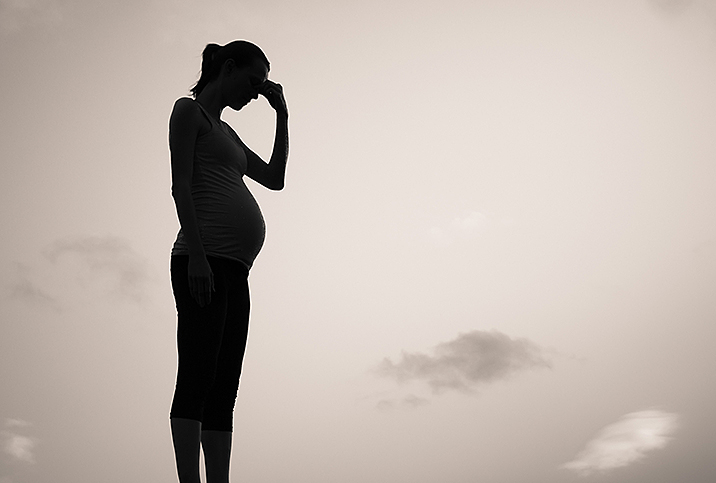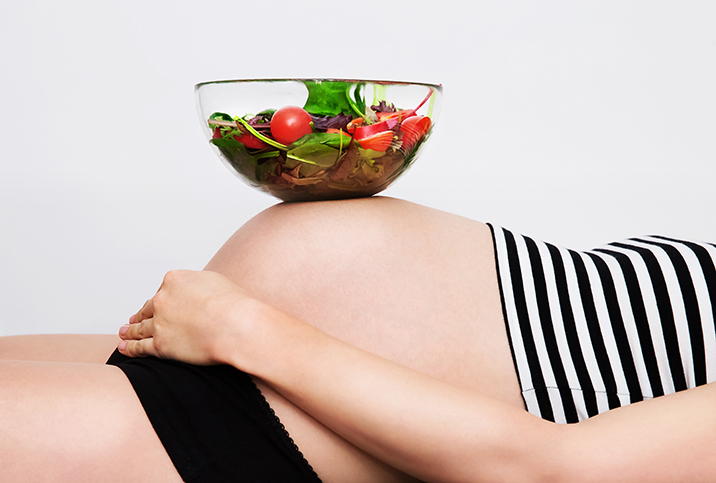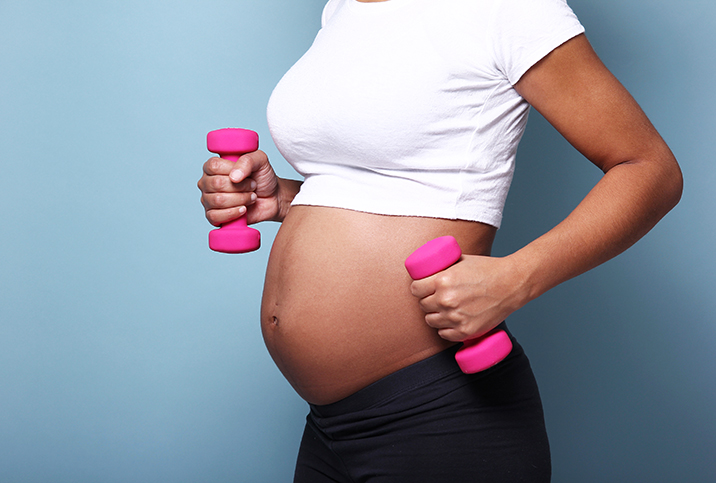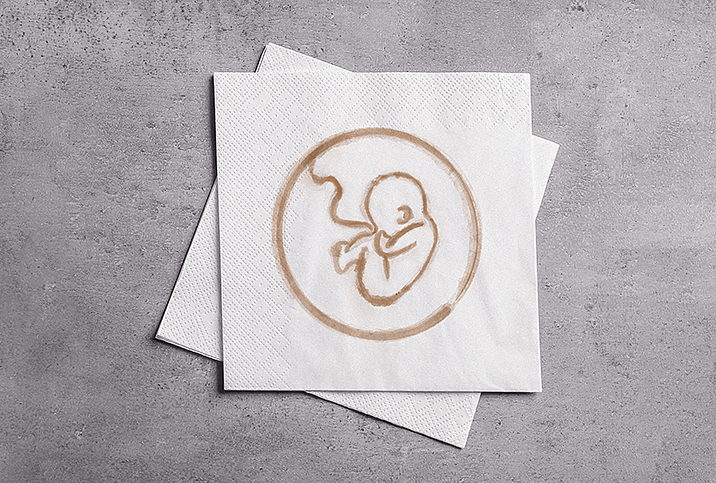Depression During Pregnancy Is More Common Than You Think

Lizabeth, a mother of three from Upstate New York, was confused when her early pregnancy was marked with depression and not excitement. "In the first 12 weeks of pregnancy, when I was feeling depressed and did not know why, I was afraid to voice it. I had tried for this baby, his big sisters were excited, and you don't get to complain about something you wanted, right? You aren't allowed to say that you no longer wish to be pregnant when you are lucky enough to have conceived on the first try with no assistance," she said. "This is what I felt like at the time. The feeling was physically palpable, and as a person who needs to find an explanation for everything, I couldn't make sense of it."
This is only part of Lizabeth's story. And, her story is not uncommon. Approximately 1 in 10 women suffer from antenatal depression. Despite it affecting so many women, it remains a taboo subject.
"I am not entirely sure if there is still a stigma around antenatal depression, but to this day, I haven't heard parents speak about it in my 17 years of motherhood," stated Lizabeth.
Helen Dempsey-Henofer, LCSW, who provides evidence-based Acceptance and Commitment Therapy to treat grief and anxiety from a feminist perspective, told us, "Studies suggest that despite postpartum depression getting a lot of attention, antenatal depression occurs at a higher frequency."
Research indicates the number of women experiencing antenatal depression varies from 7 percent to 20 percent in high-income countries, with that number increasing in low- and middle-income countries.
With postnatal depression now becoming more widely discussed, why isn't this awareness extended to antenatal depression?
The ongoing stigma attached to antenatal depression
"Imagine you're newly pregnant," described Dempsey-Henofer. "Stores are filled with adorable rompers for newborns, magazines and social media are filled with pictures of balloons and games. There's a marketing celebration of pregnancy. Now, imagine your friend Jill gets pregnant and isn't feeling cute and happy. She's not feeling the marketing celebration. Being out of sync with the social story compounds that feeling that she feels not cute, not happy, and wrong for feeling the way she does."
'When experiencing antenatal depression, expectant mothers may feel internal or external judgment or shame that their experience does not match these social expectations.'
Carrie Krawiec, a licensed marriage and family therapist at Birmingham Maple Clinic in Troy, Michigan, further delved into this topic.
"Pregnancy, for many people, is supposed to seem like a very joyful time of life. People get a lot of attention, and the expected feedback of expectant mothers is that they would be enthusiastic about their upcoming pregnancy. When experiencing antenatal depression, they may feel internal or external judgment or shame that their experience does not match these social expectations," she said.
And for women who aren't feeling excited, faking it can lead to worse symptoms.
Krawiec continued, "They may also feel a sense of 'imposter syndrome' if they are faking an exuberant experience but their internal experience does not match. This can all lead to insecurity and self-shame, and anxiety that exacerbates the depressive symptoms."
Antenatal depression is a mental health condition. It isn't something you have to "just get on with." It can be treated with the right care and support. It can affect anyone at any time in pregnancy. Anyone. However, there are some people more at risk than others.
Who is more at risk of antenatal depression?
"Family history of depression increases the likelihood, as does social stressors," stated Dempsey-Henofer. "In 2021, mid-pandemic, it would be reasonable to expect increased rates due to increased social stressors."
Women deemed more at risk for antenatal depression include those who:
- Have previously had depression or anxiety
- Are having an unplanned pregnancy
- Have little support from family or friends
- Are experiencing or have experienced domestic abuse
- Are going through a challenging life event
- Are having a complex pregnancy
- Have other medical or mental health conditions to balance alongside pregnancy
Krawiec added poverty, a history of substance abuse and a history of traumatic births or pregnancy losses can also put women at risk for antenatal depression.
"Pregnancy can cause several hormonal changes in women," said Krawiec. "For some, experiences of depression are lifted during this period, and for others, they are worsened."
For women suffering from depression or anxiety before pregnancy, alterations to their mental health management, such as medication or lifestyle changes, can impact their mental state during pregnancy.
Krawiec said, "Some women with well-managed depression may feel it important, or be strongly advised, to discontinue their depression treatment or medication before or upon conception, and [this] therefore may contribute to experiencing a depressive episode prior to delivery."
What are the warning signs to look for if you think you, a friend or a loved one may have antenatal depression?
"Signs of antenatal depression are the same as for depression," explained Krawiec, citing low activity and motivation, sadness, worry, irritability, irregular sleeping, over- or undereating, feelings of worthlessness or hopelessness, and thoughts of suicide or death.
"[Symptoms] may be missed at times because they may just be attributed to 'hormonal changes' or adjustment to pregnancy. Or they may seem like the physical results of pregnancy, like tiredness and weight gain," added Krawiec.
It's important to remember some people with depression don't actually show any outward symptoms.
As Dempsey-Henofer said, "You might notice a behavior change, but you might not. Many depressed people smile and get through their day. If a friend is pregnant, and if you want to give them space to talk about it, you might just say that you know it's not a happy time for everyone and that you're available to talk."
Antenatal depression treatments
Depression treatment looks different for everyone, so discuss options with your doctor, and don't be afraid to speak openly about the symptoms you're experiencing. Antenatal depression is common, and you're not alone. Many healthcare providers offer depression screenings during pregnancy, so ask your physician if you're unsure you're suffering from depression.
"While some antidepressant medications are not advised during pregnancy, others may be acceptable," explained Krawiec. "So talk to your doctor. Talk therapy, relationship counseling, group therapy, recommendations for adequate sleep, nutrition and exercise, and social activity may also help reduce the intensity or duration of depression symptoms."
'[Symptoms] may be missed at times because they may just be attributed to hormonal changes or adjustment to pregnancy.'
"There are many different treatment options," added Dempsey-Henofer. "Social isolation, or a feeling of social isolation, is such a huge factor. A first step could be to reach out to your obstetrician and ask about moms' groups where it's okay not to be sunshine and rainbows."
Remember: Anyone can get antenatal depression, even if they have never had depression before. It can happen to women from all walks of life.
Dempsey-Henofer concluded, "If you get into crisis...reach out to a friend, family member or professional. This could be your healthcare provider if you don't know where else to turn. They can connect you with the support you need."
You are not alone.




















